Living a nomad life
Priyanka Gupta, an IIT Delhi graduate who previously worked in the corporate world, chose a life far from routine and stability. She wanted to find fulfillment and happiness beyond the constraints of a steady job, and this led her to embrace a slower, more intentional way of living. Priyanka travels across India and around the world, living a nomadic lifestyle while capturing her experiences through writing. Instead of focusing on videos or following social media trends, she chose to document her journeys through blogs and stories. Her writing reflects the people she meets, the places she visits, and the small, meaningful moments along the way. Through her words, readers can see life from her perspective and feel the challenges, discoveries, and joys.
- Mrunal
- September 29, 2025
Boss Naari: You studied at IIT Delhi and worked in corporate before stepping into this new world where you’ve been exploring life in your own way. What inspired this shift. How did your journey really begin?
Priyanka: I studied at IIT, and after that I entered the corporate world. But I wasn’t enjoying my job. It didn’t bring me happiness and it didn’t motivate me to push myself harder. Very early on, I began looking for alternate careers, wondering what else I could try and where I could truly fit in. After a long period of experimenting with different things, I finally chose writing. Now it has been more than eight years of writing full time, and I can finally say I’m happy with where I am.
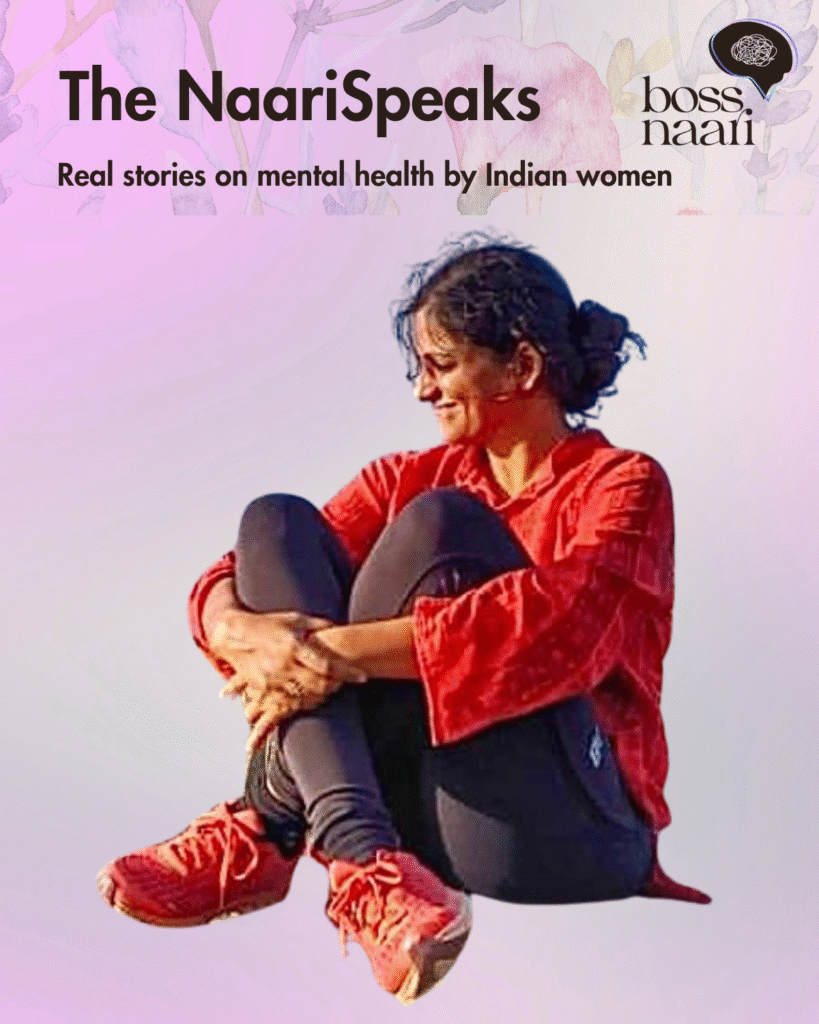
Boss Naari: Leaving behind a stable corporate job is not something most families easily accept. Parents often have their own expectations, and such decisions can be shocking to them. How did your family react when you decided to step away from the conventional path and follow something so different?
Priyanka: My family’s reaction was not sudden because the change didn’t happen in a single day. Over the years, I kept quitting my jobs. For example, when I had a campus placement job, I quit within a year and a half. At the same time, I had started working in a restaurant alongside my job to see if that was something I could pursue. That was the first real shock to them.
After that, I quit again and tried to join a culinary school in Italy. I was exploring the idea of opening a restaurant. I had even started a food blog. These were the different things I experimented with, and it was very hard for them. The journey unfolded slowly, and it took a few years before I finally reached a place where I could say with clarity, “Now I will be writing.”
It was very difficult for them because they had never expected anything like this. It wasn’t just about me being from IIT, but also because of our family background. No one in my family is a chef, no one is a writer, and no one had ever thought of pursuing something other than a conventional job.
So watching their daughter walk away from such a prestigious degree to chase careers that most people are trying to escape from was extremely hard for them. Their reaction was very strong in the beginning, and it stayed that way for quite a while. I had to spend a lot of time managing their expectations, explaining my side of the story, and constantly dealing with the conflict. It was really tough in the beginning.
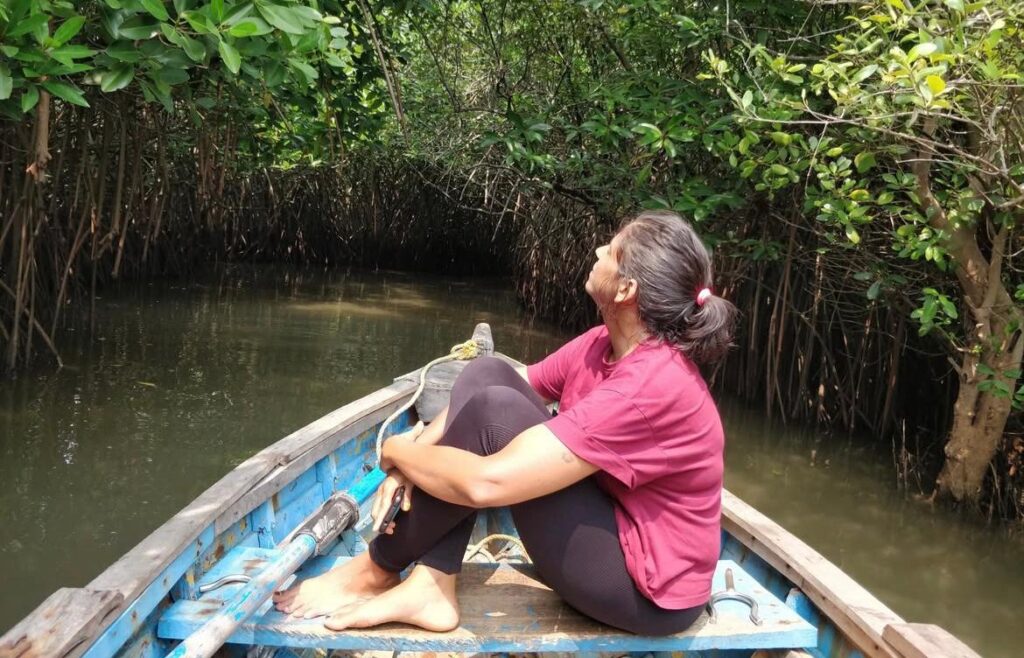
Priyanka enjoying a boat ride in the mangrove forest.
Boss Naari: Your journey seems to have taken many turns. Earlier, you were unmarried, and like most parents of girls your family probably expected you to get married and settle down. At the same time, you chose to pursue writing and travelling. How did you manage to explain your choices to your family while still following your passion?
Priyanka: When I took that long solo trip, I was around 28 or 29. I had given up my apartment and corporate job, so suddenly I had no projects, no commitments, and no home. My parents were concerned that I should have been married by then. I did not worry about my age, but convincing my parents was the challenge.
I reassured them about my trip to South America and kept them updated. I also explained to them that in South America there are many Indian people, and if they know any boy, they can share the details with me, and I will have a conversation with that person. This helped them feel more at ease, as in my parents’ view, marriage had to happen eventually. For me, marriage was more about calming my parents than a personal choice. I was happy following my own path, and my decisions were never about conforming to societal expectations.
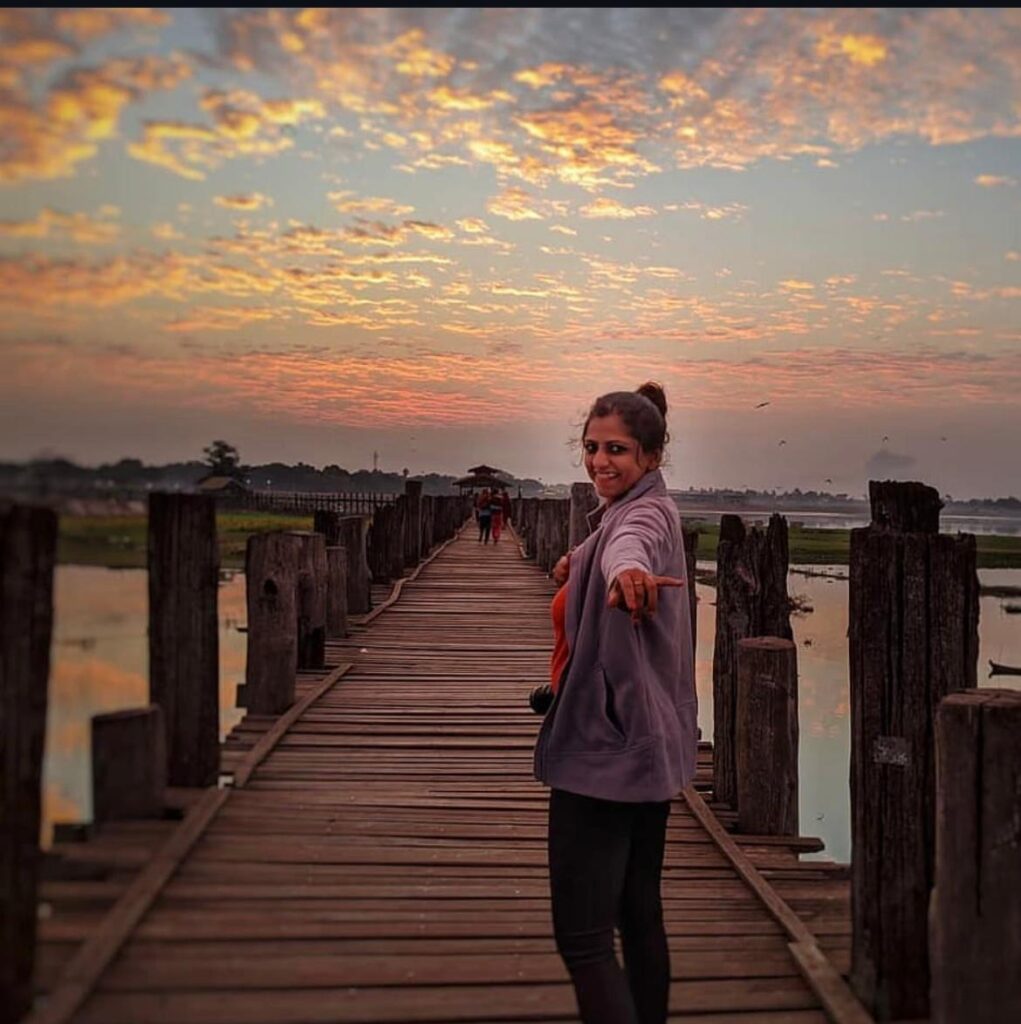
Smiling bright, living the best of her life.
Boss Naari: After getting married, how did your partner accept and support the life you love to lead, especially your travelling and writing?
Priyanka: My travelling and lifestyle were never points of negotiation. He himself enjoys exploring, so we have been travelling across India for over four and a half years without a permanent address. We gave up our home in 2021, and he has a remote job. Even now, I go on solo trips, and he sometimes travels for work. This is our life, and we are very happy with it.
Boss Naari: You have travelled both solo and with a partner. How do these experiences differ, and what challenges have you faced, especially in India?
Priyanka: Travelling solo and with a partner are very different experiences. In India, travelling with a partner is challenging if you are not married because many guest houses, hotels, and homestays ask for marriage proof. About 70% of places operate this way, and it can be stressful when arriving late or on weekends. Being married has made things easier and also helps when interacting with older hosts, who are more accepting.
When I travelled solo, these questions never came up, though solo travel has its own challenges. Overall, the experiences are very different but equally rewarding.

Priyanka and her husband, while traveling.
Boss Naari: Along with being a writer, you are also an avid traveler. How do you manage to balance both writing and travelling when each requires so much time and energy?
Priyanka: It is actually not always very easy because I like to work a lot and I have so many stories to tell.
I have been travelling for a long time. Initially, when I was in the corporate world, I used to go on short trips of two or three days, or sometimes a week. At that time, I was not very deeply into travelling. In fact, I might even say no to a trip if I did not feel like going. But after I went to South America in 2016, things changed. That trip, which combined South America and Southeast Asia, lasted almost a year. It completely transformed my outlook on travelling. That was also when I got into full-time writing, around 2017, after coming back from South America.
Since then, I have been travelling and writing consistently. The way I manage both is by maintaining a routine. Some days I wake up and dedicate the morning to exploring a new place. On other days I keep my mornings completely blocked for writing and then step out in the afternoon. It is always about finding balance. Sometimes I travel very slowly, staying in one place for 10 days or even a few weeks, and that gives me the space to write as well as experience the place.
It is a constant process of learning and evolving, figuring out how to manage my time better. I think that is true for all of us, no matter what we do. For me, the challenge has never been about not knowing what to write. My challenge has always been that there is too much I want to share. Every day brings new experiences and beautiful moments, and I feel like I have more stories than I can practically tell. So I am learning to choose which stories to write and which ones to simply keep with me.

While traveling, Priyanka always makes time to write.
Boss Naari: You said you have so many stories to tell. Some you keep to yourself, some you write. Is there any story that is very close to your heart, something that makes you feel happy doing what you do?
Priyanka: There are so many stories like that. When we travel constantly, there are many hard days. You are not at home, not in your comfort zone. You have to go out, speak with different kinds of people, adjust to a new geography, find new shopkeepers, and learn how to navigate a place. It is not easy. Every day you have to relearn some basic things.
But these challenges bring unforgettable moments. I meet people and see places I would never have discovered if I stayed at home. For example, I recently visited a beautiful home in Kolkata and realized how small details can make a place so charming. Experiences like this make me grateful for the journey I chose.
Another time, we stumbled upon a tiny restaurant with food so good it felt like a rare discovery. It was a small, narrow lane, and we had never been there before. We kept following Google Maps and eventually reached a place that served very good, simple, and delicious food.
These experiences are moments I cherish. It is hard to name just one person because I have met so many amazing people. They inspire me with their simplicity and kindness, and these encounters happen very often.

Priyanka’s photo with the animals during her jungle safari.
Boss Naari: There are always two sides to a story. People can either appreciate or criticize. How do you deal with criticism, whether from friends, acquaintances, or strangers?
Priyanka: I have definitely experienced both appreciation and criticism. My choices have been unconventional, so strong reactions are expected. Sometimes I get very encouraging messages or emails saying it is amazing what I am doing, that my travels and writing are inspiring, and that people love my work. Those messages are motivating and affirming.
In person, criticism can be stronger. For example, a friend’s father once told me that I should have found another job before quitting, especially in this economy. Others have judged the places I travel to, saying South America is not safe or that I stay in budget accommodations because I cannot afford better. There are countless judgments one can imagine.
Feedback on my writing has mostly been constructive. Early advice, like making endings stronger or focusing on my own voice, still guides me today. Sometimes my blogs draw criticism from locals, but others support me, recognizing that I am sharing my honest experience.
I focus on what is useful and ignore the rest. Considering the context of the person giving feedback helps me decide what is meaningful. It can be challenging, but the positive feedback always keeps me going.
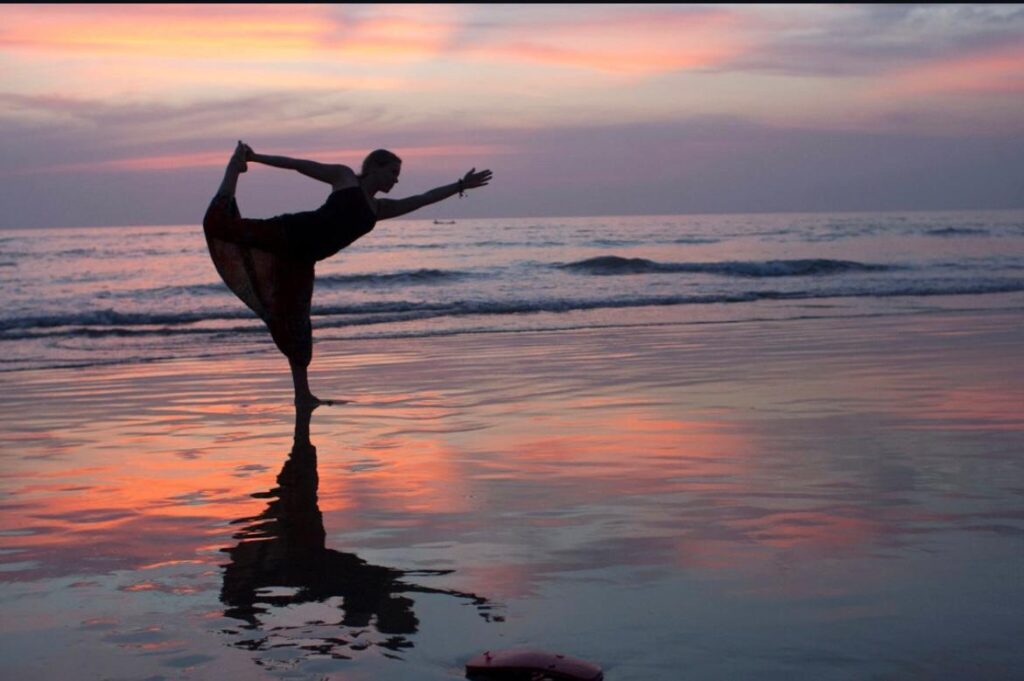
Enjoying the sunset view at the beach.
Boss Naari: Travelling, writing, and doing what you love can feel like a kind of therapy.
Priyanka: Yes, you could call it mental therapy. Many people get stuck in routines, trying to manage everything, financial stability, career, daily responsibilities. Choosing to follow your passion instead of worrying constantly about the future can make a huge difference for mental well-being.
Mental health connects with every part of life. If we are not doing something that makes us happy or gives us peace at the end of the day, it affects our mental state. For some, this means quitting a job; for others, it might mean changing roles or learning something new.
When I left my corporate job to write full-time, I did think about my financial situation and made a plan. Basic survival cannot be ignored. Anyone considering a career change should ask themselves: How will I support myself? How will I cover food, shelter, clothing, and health care? Once the basics are secure, pursuing your passion is possible without constant worry.
I started with some savings and freelance work, and gradually built my path. Even now, life is not always easy. There are countless tasks, deadlines, and responsibilities. But knowing why you do what you do and having a plan helps you stay grounded. Mental peace comes not just from following your passion but from knowing your foundation is solid.
Pursuing your dreams matters, but practical planning ensures you can do it sustainably without worrying about tomorrow.
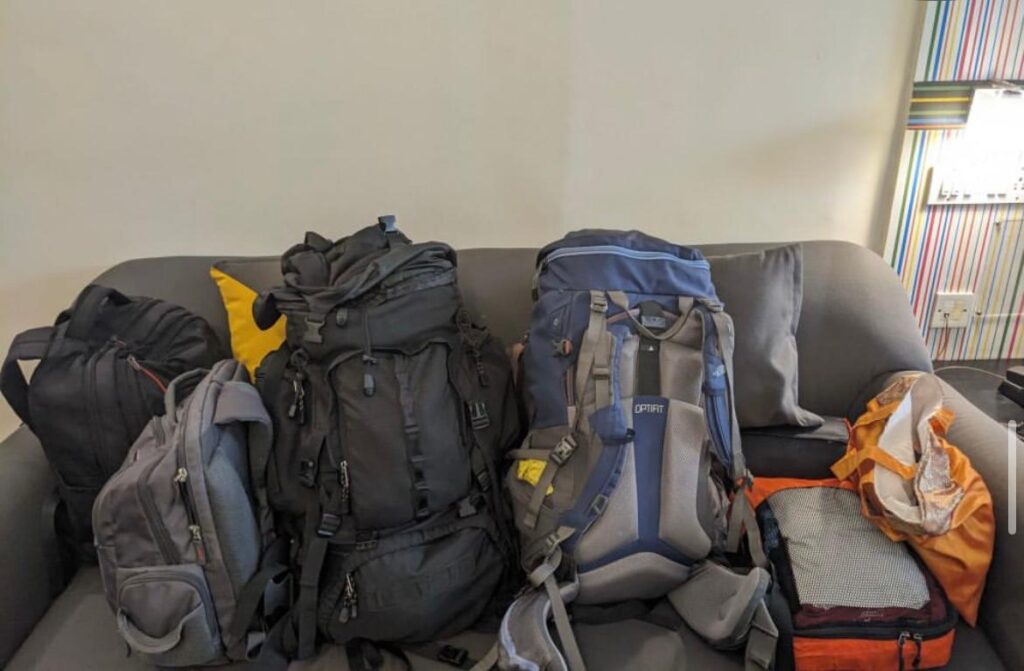
Backpacks ready for a new trip and new stories.
Boss Naari: If you had to give one piece of advice to young women who are just starting out or feel stuck between societal expectations and their own dreams, what would it be?
Priyanka: I would say don’t try to fit into the roles society has set for you. Step out of those expectations and ask yourself what you truly want. When you look in the mirror, what do you want to see? How do you want to feel when you wake up? What do you want to be known for? Let those questions guide your choices.
Don’t make decisions based on what others will think. Focus on what you want to do, and handle the aftermath later. Life will have its chaos, like running to catch a train and stumbling along the way, but the journey is yours to live. There will always be noise around you, ignore it. You have the right to live the life you want without compromise.
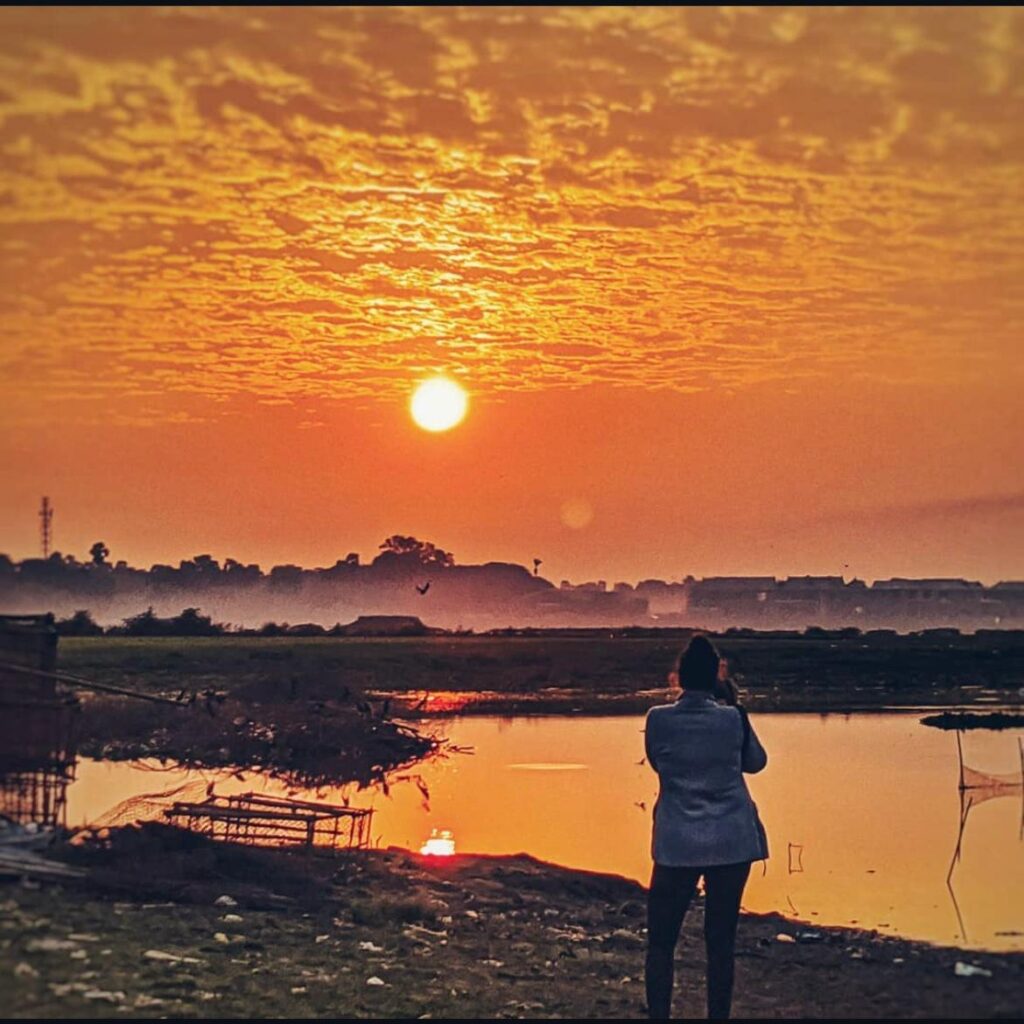
Capturing the moment through her lens.
Boss Naari: And looking ahead, how do you see your journey unfolding?
Priyanka: I see myself continuing to write and explore. There are countless stories waiting to be told, and it’s magical when what’s in my head comes alive on paper and connects with readers. I travel slowly, taking time to absorb and learn from the people and places I visit. I aim to embrace simplicity, to live with more ease, and to take life one day at a time. I hope to flow through life more like a river, learning to manage the turmoil and challenges with grace, rather than being caught in constant turbulence.
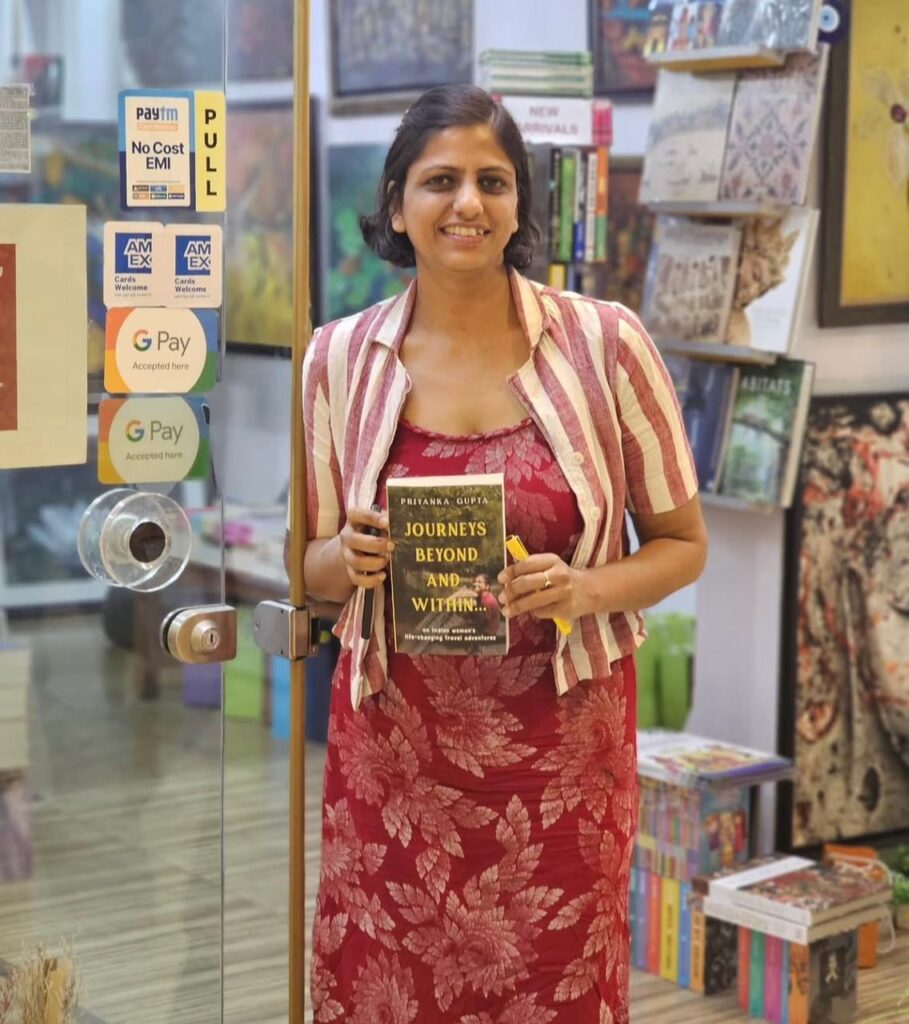
Priyanka with her book Journey Beyond and Within.
Boss Naari: Many travelers today share their journeys through vlogs, videos, or blogs. Have you ever thought about other ways to document or share your experiences beyond writing?
Priyanka: I have not personally thought about filming. Many have suggested it, but I want to experience a place fully, not through a camera. Chasing the perfect shot can make you miss the moment. Writing lets me capture experiences in my mind, heart, or notes while staying present. Traveling is almost meditative. You notice new sights, smells, and people while navigating a place. I rarely carry a notebook or type notes, and even with a camera, I limit photos to remain immersed. Videography would take away from that. I research destinations minimally to keep my first impression fresh.
I also avoid giving travel instructions. My blog is narrative, sharing experiences and context, but each traveler’s journey is personal. I focus on my moments and discoveries rather than creating a checklist for others.
I have also written a book, Journey Beyond and Within, about my experiences. It covers my career journey, how my family reacted, dealing with criticism, and my travel experiences, both solo and with my partner. It goes into more detail and gives a more visual account of the moments that make all of this worthwhile.
Want to be featured on NaariSpeaks?
Do you have a story that could inspire another woman or help someone going through a similar journey? We’d love to hear from you and share your voice with our community.
Liked what you read?
Sign up and get the latest blog posts delivered straight to your inbox.
We respect your privacy
Related Arcticles

Down syndrome didn’t define her; dance did
Down syndrome didn’t define her; dance did Dance became the language of Sayalee Agavane, a Down Syndrome professional dance artist who has transformed every stage

Raising a child with Down Syndrome
Raising a child with Down Syndrome Parenting a child with Down syndrome is a journey filled with unique experiences, and the early days of acceptance

Living with extra chromosomes
Living with an extra chromosome Down syndrome cannot stop anyone from achieving their dreams, and Madhumati Indalkar is a beautiful example of that. Madhumati has
